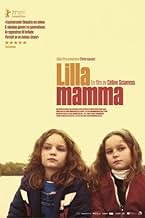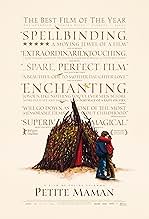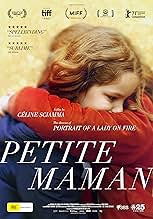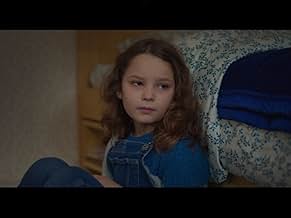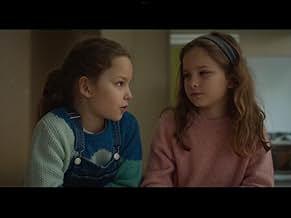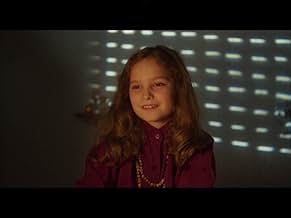IMDb-BEWERTUNG
7,4/10
19.845
IHRE BEWERTUNG
Nelly hat gerade ihre Großmutter verloren und hilft ihren Eltern, das Elternhaus ihrer Mutter auszuräumen. Sie erkundet das Haus und den umliegenden Wald. Eines Tages trifft sie ein gleichal... Alles lesenNelly hat gerade ihre Großmutter verloren und hilft ihren Eltern, das Elternhaus ihrer Mutter auszuräumen. Sie erkundet das Haus und den umliegenden Wald. Eines Tages trifft sie ein gleichaltriges Mädchen, das ein Baumhaus baut.Nelly hat gerade ihre Großmutter verloren und hilft ihren Eltern, das Elternhaus ihrer Mutter auszuräumen. Sie erkundet das Haus und den umliegenden Wald. Eines Tages trifft sie ein gleichaltriges Mädchen, das ein Baumhaus baut.
- Nominiert für 1 BAFTA Award
- 9 Gewinne & 37 Nominierungen insgesamt
Empfohlene Bewertungen
A hot take: this really needed more Totoro or Cat-Bus. Wouldn't it have been something to see Marion and/or Nelly chilling out on the belly of a cute little troll with black wood sprites flying about?
My comparison to Miyazaki isn't some big leap or accident as Celine Sciamma has been up front about the inspirations for her film. What I took from this was maybe something that is perhaps an extrapolation of how it was made which is, since it has to be in 2020 into early 2021, a Covid-era pandemic movie. That it begins with a little girl saying Au revoir to several seniors at an old age home from which her grandma just died (don't forget as the cliche and song go the Children are the Future) can't be completely accidental or coincidental, and if she wrote it in some sense as a way of coping or reckoning with this period in time I get it. That it's also about the girl/Nelly's mother going away to some operation tracks back to Totoro and that idea of expressing a childhood point of view but with a dollop of surrealism/magic realism (spoiler, the other little girl, who is played by the performer's twin, is supposed to be not simply a little friend but the title character).
I find coming to this after it seems practically everyone else I follow critically has watched it and heaped buckets of praise on it that I'm somewhat outside the pack simply calling it *good* and not some total masterwork (my better half couldn't stand it but that's another story). I come to this also as a big fan of 'Portrait' and had high hopes for whatever she had to offer. I like Sciamma as a director, I like how she has a gentle and delicate sensibility with her performers and has these patient frames. From my limited perspective on her style (only seen these two for now) you're either completely immersed in her existential cinematic grammar or you're not. I was here up to a point, but wanted something.... more. Or perhaps even less.
At 70 minutes this is a thin slice of storytelling, but that's hardly a negative. Authors for centuries have created novellas and short novels that contain multitudes on the human condition. Maybe some of my lack of connection here is not for disliking what she does so much as what is not here or left out. This is a story that has grief as a theme, but aside from a couple of instances where the little girls have fun making pancakes or spitting out a little bit of bad soup, they're restrained... maybe so restrained that it feels uneasy at times. Maybe that's part of the point, but I had to wonder if it was because these are girls who haven't acted much before that Sciamma had them do less because she knew they couldn't or simply by design of the script.
Either way there is that and also the distinct lack of music. That of course, as in Portrait of a Lady on Fire, leads to an astonishing point where music does come in near the end. But aside from that and maybe one other small moment there isn't any score here, and it's so quiet that it's maybe too quiet for a story about girls (yes even as one is the Maman) who form a connection. Or to put it another way, it's a story with a kind of slightly heightened magical sense, maybe akin to something out of Rivette, and it's played so straight that ALL the work is on us as the audience to interpret. Again, I don't mind that work, but even at 70 minutes it asks a lot emotionally.
I don't mean to give the impression I wasnt captivated by this or admire it as I certainly do, but perhaps it edges to being slightly overrated as well. As either a short film at 30 minutes or a longer feature it could either condense its ideas into something still as profound but more to the point (still keeping her patience and time in scenes), or as a longer feature with more time with Nelly and/or Marion and the parents. It's a gentle little movie that is pretty and in its own muted dimensions charming, but I don't see it staying with me as long as her other film and didn't hit the kind of chord maybe I'm just looking for more after these last two years (ironically Portrait was one of the last films I saw in a theater before lockdown).
My comparison to Miyazaki isn't some big leap or accident as Celine Sciamma has been up front about the inspirations for her film. What I took from this was maybe something that is perhaps an extrapolation of how it was made which is, since it has to be in 2020 into early 2021, a Covid-era pandemic movie. That it begins with a little girl saying Au revoir to several seniors at an old age home from which her grandma just died (don't forget as the cliche and song go the Children are the Future) can't be completely accidental or coincidental, and if she wrote it in some sense as a way of coping or reckoning with this period in time I get it. That it's also about the girl/Nelly's mother going away to some operation tracks back to Totoro and that idea of expressing a childhood point of view but with a dollop of surrealism/magic realism (spoiler, the other little girl, who is played by the performer's twin, is supposed to be not simply a little friend but the title character).
I find coming to this after it seems practically everyone else I follow critically has watched it and heaped buckets of praise on it that I'm somewhat outside the pack simply calling it *good* and not some total masterwork (my better half couldn't stand it but that's another story). I come to this also as a big fan of 'Portrait' and had high hopes for whatever she had to offer. I like Sciamma as a director, I like how she has a gentle and delicate sensibility with her performers and has these patient frames. From my limited perspective on her style (only seen these two for now) you're either completely immersed in her existential cinematic grammar or you're not. I was here up to a point, but wanted something.... more. Or perhaps even less.
At 70 minutes this is a thin slice of storytelling, but that's hardly a negative. Authors for centuries have created novellas and short novels that contain multitudes on the human condition. Maybe some of my lack of connection here is not for disliking what she does so much as what is not here or left out. This is a story that has grief as a theme, but aside from a couple of instances where the little girls have fun making pancakes or spitting out a little bit of bad soup, they're restrained... maybe so restrained that it feels uneasy at times. Maybe that's part of the point, but I had to wonder if it was because these are girls who haven't acted much before that Sciamma had them do less because she knew they couldn't or simply by design of the script.
Either way there is that and also the distinct lack of music. That of course, as in Portrait of a Lady on Fire, leads to an astonishing point where music does come in near the end. But aside from that and maybe one other small moment there isn't any score here, and it's so quiet that it's maybe too quiet for a story about girls (yes even as one is the Maman) who form a connection. Or to put it another way, it's a story with a kind of slightly heightened magical sense, maybe akin to something out of Rivette, and it's played so straight that ALL the work is on us as the audience to interpret. Again, I don't mind that work, but even at 70 minutes it asks a lot emotionally.
I don't mean to give the impression I wasnt captivated by this or admire it as I certainly do, but perhaps it edges to being slightly overrated as well. As either a short film at 30 minutes or a longer feature it could either condense its ideas into something still as profound but more to the point (still keeping her patience and time in scenes), or as a longer feature with more time with Nelly and/or Marion and the parents. It's a gentle little movie that is pretty and in its own muted dimensions charming, but I don't see it staying with me as long as her other film and didn't hit the kind of chord maybe I'm just looking for more after these last two years (ironically Portrait was one of the last films I saw in a theater before lockdown).
Petite Maman is a warm bundle of cinematic magic. Director Celina Sciamma's French coming of age sci-fi hybrid never gets too bogged down in tedious specifics of its fantastical set-up. Petit Maman bends time to tell the story about the bond between a daughter and her mother that transcends it.
Petite Maman, which I had the pleasure of seeing at the Middleburg Film Festival, centers itself around a little girl named Nelly (Josephine Sanz) and her family, reeling after the death of a loved one, as they spend some time in Nelly's mother's childhood home. Nelly's mother leaves the family behind in the midst of the immense grief she's suffering, leaving her husband and daughter with little idea of when she'll return. In the meantime, Nelly ventures into the woods, where she meets and begins to pal around with a young girl, who she learns, by some twist of cosmic fate, is a much younger version of her own mother, who faces trials of her own. A single stretch of woods bridges decades between them. Together, they try to help each other cope in these moments of personal turmoil and Nelly can maybe get to understand why her mother left and what she's going through. This movie quite literally follows its two leads after their meeting, making food, building forts, making believe. Petit Maman uses those pastimes of youth to hit audiences with a surprisingly layered exploration of something as monumental as grief from a kid's perspective.
I loved, loved, loved the setup of this movie-it doesn't ever seek to explain how Nelly and this younger version of her mother meet in terms of time and space, but it uses that heightened concept to speak to something more human. Here, two children reckon with fear and their powerlessness in the conflicts they face, and in the comfort and security they give each other lies the courage to face them.
The lesson of Petite Maman is just to be there for the people you love in times of great difficulty.
I give Petite Maman 3.5 out of 5 stars and recommend it for ages 5 to 12. It's an understated, but moving little gem that I hope doesn't escape people's radar. By Benjamin P., KIDS FIRST!
Petite Maman, which I had the pleasure of seeing at the Middleburg Film Festival, centers itself around a little girl named Nelly (Josephine Sanz) and her family, reeling after the death of a loved one, as they spend some time in Nelly's mother's childhood home. Nelly's mother leaves the family behind in the midst of the immense grief she's suffering, leaving her husband and daughter with little idea of when she'll return. In the meantime, Nelly ventures into the woods, where she meets and begins to pal around with a young girl, who she learns, by some twist of cosmic fate, is a much younger version of her own mother, who faces trials of her own. A single stretch of woods bridges decades between them. Together, they try to help each other cope in these moments of personal turmoil and Nelly can maybe get to understand why her mother left and what she's going through. This movie quite literally follows its two leads after their meeting, making food, building forts, making believe. Petit Maman uses those pastimes of youth to hit audiences with a surprisingly layered exploration of something as monumental as grief from a kid's perspective.
I loved, loved, loved the setup of this movie-it doesn't ever seek to explain how Nelly and this younger version of her mother meet in terms of time and space, but it uses that heightened concept to speak to something more human. Here, two children reckon with fear and their powerlessness in the conflicts they face, and in the comfort and security they give each other lies the courage to face them.
The lesson of Petite Maman is just to be there for the people you love in times of great difficulty.
I give Petite Maman 3.5 out of 5 stars and recommend it for ages 5 to 12. It's an understated, but moving little gem that I hope doesn't escape people's radar. By Benjamin P., KIDS FIRST!
... just like eight year old Nelly, whose vivid imagination is brought to life when she meets her doppelganger Marion after her mother absents herself from her life for a few days. Beautifully filmed and acted, it may get you reflecting on your own perceptions of the world when you were that age or even as you got older, if you were lucky enough to carry that imagination with you.
'Petite Maman (2021)' is an extremely low-key movie about a young girl who makes a new friend while staying at her recently deceased grandmother's house as her parents sort through the late matriarch's belongings. Even its subtle but significant fantastical elements (the exact nature of which are suitably ambiguous) are presented in a very realistic, down-to-earth way. It may very well just be the first social-realist children's fantasy film I've ever seen and it works far better than it perhaps ought to. Its lack of exaggeration allows it to hit home especially hard, as it feels like an experience that almost all of us will be able to relate to on some level. It acts as a sort of pseudo nostalgic retrospection for adults and, I'd imagine, an in-the-moment reflection of reality for children. Because of this, I actually think that it would be a good flick to watch with your own kids, especially since it deals with themes surrounding the relationship between parent and child. It isn't sappy like most movies dealing with a similar subject; in fact, it has a rather potent underpinning of melancholy to it. This sadness is profound yet benevolent, a representation of the slightly intangible and partially existential dread that inevitably exists on the fringes of everybody's own existence. The film posits that sadness is simply a part of life, something to be dealt with as it arises rather than pushed deep down below the surface. At the same time, the flick isn't even close to dour (evidence of that can be found in the genuine joy it is able to inspire simply by portraying the innocent laughter of children). It just represents reality as most of us experience it: flawed, somewhat monotonous and filled with ups and downs. There's an uplifting vibe to the overall affair and it all actually feels rather poignant. Though it isn't the most straightforwardly exciting or compelling piece, it does have a distinct effect and lingers with you for quite a while after it is over. It's a lovely film, despite its motifs of sadness and grief. It's also pretty unique in its own way. It's really good. 7/10.
Great movie! A wonderfull masterpiece of love, loss, magic and time.
This director surprises me more and more, with her delicate stories, her sensitive photography, and this film is a clear example of what she can create.
This director surprises me more and more, with her delicate stories, her sensitive photography, and this film is a clear example of what she can create.
Wusstest du schon
- WissenswertesCéline Sciamma served as costume designer as well as writer and director for the film, as she did for Mädchenbande (2014).
- Crazy CreditsDuring the end credits the lyrics to the song are displayed one word at a time in the lower left corner.
- SoundtracksLa Musique du Futur
Composed by Jean-Baptiste de Laubier
Arranged by Arthur Simonini
Lyrics by Céline Sciamma
Interpreted by the Maîtrise Notre Dame de Paris
© Lilies Films / Para One / Savoir Faire
(p) 2021 Lilies Films
Top-Auswahl
Melde dich zum Bewerten an und greife auf die Watchlist für personalisierte Empfehlungen zu.
- How long is Petite Maman?Powered by Alexa
Details
Box Office
- Budget
- 2.800.000 € (geschätzt)
- Bruttoertrag in den USA und Kanada
- 829.065 $
- Eröffnungswochenende in den USA und in Kanada
- 45.764 $
- 24. Apr. 2022
- Weltweiter Bruttoertrag
- 1.990.331 $
- Laufzeit
- 1 Std. 13 Min.(73 min)
- Farbe
- Seitenverhältnis
- 1.85 : 1
Zu dieser Seite beitragen
Bearbeitung vorschlagen oder fehlenden Inhalt hinzufügen


![Bande-annonce [OV]](https://m.media-amazon.com/images/M/MV5BODAyNjc2ODQtODczMi00YThiLWI0ODMtZDE5M2I3NWQ2YmNjXkEyXkFqcGdeQXRyYW5zY29kZS13b3JrZmxvdw@@._V1_QL75_UX500_CR0)

